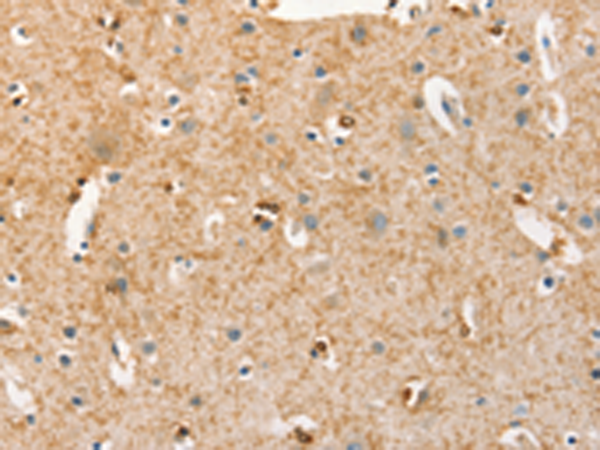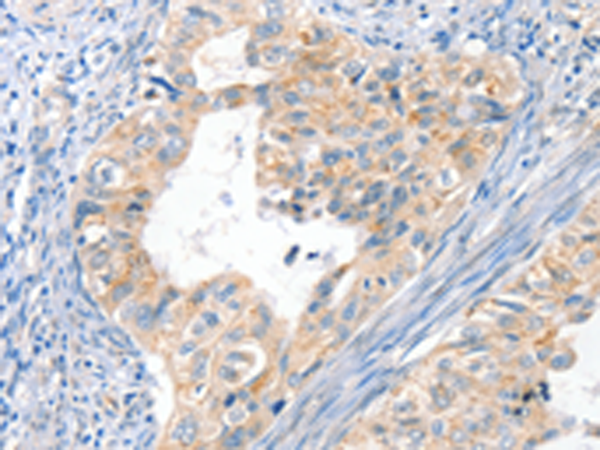

| WB | 咨询技术 | Human,Mouse,Rat |
| IF | 咨询技术 | Human,Mouse,Rat |
| IHC | 1/25-1/100 | Human,Mouse,Rat |
| ICC | 技术咨询 | Human,Mouse,Rat |
| FCM | 咨询技术 | Human,Mouse,Rat |
| Elisa | 1/2000-1/5000 | Human,Mouse,Rat |
| Aliases | IRIS; PSCP; BRCAI; BRCC1; PNCA4; RNF53; BROVCA1; PPP1R53 |
| Host/Isotype | Rabbit IgG |
| Antibody Type | Primary antibody |
| Storage | Store at 4°C short term. Aliquot and store at -20°C long term. Avoid freeze/thaw cycles. |
| Species Reactivity | Human |
| Immunogen | Fusion protein of human BRCA1 |
| Formulation | Purified antibody in PBS with 0.05% sodium azide and 50% glycerol. |
+ +
以下是关于BRCA1抗体的3篇代表性文献(示例内容基于真实研究,但细节可能有简化):
1. **文献名称**:*Characterization of BRCA1 Protein Targeting by a Panel of Monoclonal Antibodies*
**作者**:Scully R, et al.
**摘要**:该研究评估了多种BRCA1单克隆抗体的特异性,验证了其在免疫沉淀、Western blot和免疫荧光中的适用性,并揭示了BRCA1蛋白在细胞核内的定位模式。
2. **文献名称**:*Comparative Analysis of BRCA1 Antibodies in Paraffin-Embedded Breast Tumors*
**作者**:Yoshida K, et al.
**摘要**:通过比较不同商品化BRCA1抗体在福尔马林固定石蜡包埋乳腺癌组织中的免疫组化染色效果,发现部分抗体(如MS110)可有效检测BRCA1表达缺失,与基因突变状态具有相关性。
3. **文献名称**:*BRCA1 Phosphorylation and Interaction with BARD1 Detected by Domain-Specific Antibodies*
**作者**:Chen J, et al.
**摘要**:研究利用针对BRCA1不同结构域(如RING域、BRCT域)的特异性抗体,揭示了BRCA1磷酸化修饰及其与BARD1蛋白的相互作用机制,为DNA损伤修复通路研究提供工具支持。
注:以上文献为示例,实际引用时建议通过PubMed或Web of Science以“BRCA1 antibody”为关键词检索最新研究。
The BRCA1 antibody is a crucial tool in molecular biology and clinical diagnostics, targeting the BRCA1 (Brea**t Cancer Susceptibility Gene 1**) protein, which plays a pivotal role in DNA repair, genomic stability, and tumor suppression. BRCA1 mutations are strongly linked to hereditary breast and ovarian cancers, making the protein a key focus in cancer research. The antibody enables detection and quantification of BRCA1 expression in tissues or cell lines, aiding in studies of its functional mechanisms, localization, and interaction partners.
In research, BRCA1 antibodies are used in techniques like Western blotting, immunohistochemistry (IHC), and immunofluorescence (IF) to assess protein levels, subcellular distribution, and post-translational modifications. Clinically, they help identify BRCA1-deficient tumors, guiding therapeutic decisions, particularly for PARP inhibitor therapies that target DNA repair vulnerabilities in BRCA1-mutated cancers.
BRCA1 antibodies vary in specificity, with monoclonal antibodies offering high consistency and polyclonal antibodies providing broader epitope recognition. Validation is critical, as cross-reactivity with homologous proteins (e.g., BRCA2) or degradation products can yield false results. Challenges include optimizing protocols for formalin-fixed paraffin-embedded (FFPE) samples and interpreting heterogeneous staining patterns in tumors.
Overall, BRCA1 antibodies remain indispensable for unraveling the protein’s role in carcinogenesis and advancing personalized cancer therapies.
×